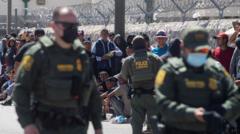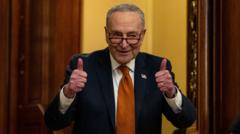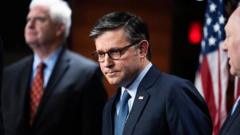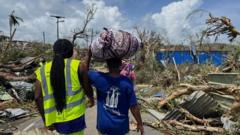In a striking move, Texas state officials have offered 1,400 acres of land situated in Starr County along the US-Mexico border to President-elect Donald Trump for potential use as detention facilities aimed at processing undocumented migrants. The Texas General Land Office stated that the site could serve for "processing and detention" in light of Trump's commitment to carry out large-scale deportations, specifically targeting those deemed violent offenders. The offer comes amid a complex landscape of state responses to migration, highlighting stark divides in immigration policy priorities across the country.
Texas Offers Land for Proposed Trump Administration's Deportation Facilities

Texas Offers Land for Proposed Trump Administration's Deportation Facilities
Texas authorities have proposed a significant plot of land to facilitate the incoming Trump administration's plans for migrant detainment and deportation.
Texas Land Commissioner Dawn Buckingham emphasized the suitability of the land, which is currently farmland and has been previously inaccessible for border wall construction, as an optimal location for such facilities. Buckingham expressed strong support for Trump’s ambitions, aligning closely with Texas' ongoing border security initiatives. While Texas moves to solidify its stance on immigration enforcement, Democratic-led states, including California, Arizona, and New Mexico, have made clear their opposition and refusal to participate in mass deportations.
Discussions on what such facilities might encompass reveal diverse operational strategies, ranging from temporary soft-sided units to more permanent incarceration structures. Critics, including rights advocates and experts, warn of potential overcrowding and financial burdens associated with mass deportations, noting that current immigration facilities are already nearing capacity. A contrasting narrative emerges as Democratic cities enact policies to limit cooperation with federal authorities.
Kathleen Bush-Joseph, an analyst, highlighted the implications of these differing state approaches, suggesting that they may lead to an expanding rift between Republican-led and Democratic-led jurisdictions. The question of logistics remains pivotal, particularly in terms of transporting detained individuals between states with varying policies on immigration enforcement.
As the proposed facilities take shape, the future of immigration in the United States hangs in a delicate balance between differing political ideologies and enforcement strategies, potentially fostering a fragmented immigration landscape across the nation.
Discussions on what such facilities might encompass reveal diverse operational strategies, ranging from temporary soft-sided units to more permanent incarceration structures. Critics, including rights advocates and experts, warn of potential overcrowding and financial burdens associated with mass deportations, noting that current immigration facilities are already nearing capacity. A contrasting narrative emerges as Democratic cities enact policies to limit cooperation with federal authorities.
Kathleen Bush-Joseph, an analyst, highlighted the implications of these differing state approaches, suggesting that they may lead to an expanding rift between Republican-led and Democratic-led jurisdictions. The question of logistics remains pivotal, particularly in terms of transporting detained individuals between states with varying policies on immigration enforcement.
As the proposed facilities take shape, the future of immigration in the United States hangs in a delicate balance between differing political ideologies and enforcement strategies, potentially fostering a fragmented immigration landscape across the nation.




















